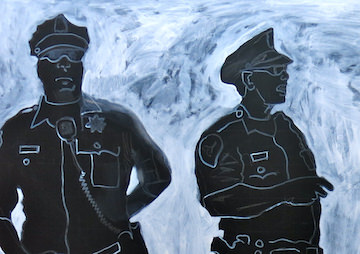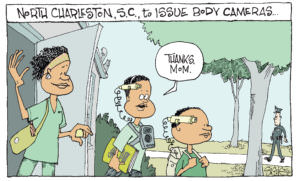Police Body Cameras Aren’t Enough — We Need More Videos by Witnesses
“The case of Walter Scott shows just how valuable a citizen with a camera can be,” writes Morgan Hargrave, a member of a group that trains civilians to expose human rights abuses with video. “We don’t need more video from the police perspective, but more from our own.” torbakhopper (CC BY-ND 2.0)
torbakhopper (CC BY-ND 2.0)
“The case of Walter Scott shows just how valuable a citizen with a camera can be,” writes Morgan Hargrave, a member of a group that trains civilians to expose human rights abuses with video. “We don’t need more video from the police perspective, but more from our own.”
Hargrave continues in The Guardian:
In North Charleston, South Carolina, where Mr. Scott was shot in the back five times by an officer on April 4, 2015, the city announced that it will deploy body-mounted cameras for each and every officer on its force. It’s a policy response that has widespread support; indeed, bodycams were a central demand from activists and Michael Brown’s family after his death in Ferguson, Missouri, while Cleveland responded to the shooting of 12-year-old Tamir Rice by buying 1,500 of the cameras.
Concerns about abuse and selective use of the cameras by police are well-founded, especially given that the rules are far from clear about when cameras will be on, what penalties (if any) there will be if an officer turns off their camera or loses footage, and who will have access to bodycam video. The original police accounts of the South Carolina shooting were shown to be so far from the truth – compare the original story from the Post And Courier with what we know now – that leaving police to record and publish video of events seems risky, to say the least.
The energy behind the deployment of bodycams should be at least matched by an equal investment in citizen witnessing. We need clearer protections for people who have the courage to record crimes by the police and clearer penalties for officers who don’t respect that right. An officer in New Jersey recently confiscated the phone of a witness who recorded the police siccing a dog on an unarmed black man, Phillip White, who later died in police custody. Some states have tried to restrict what can be filmed and to expand the leeway police have in stopping bystanders from recording them.
Read more here.
— Posted by Alexander Reed Kelly.
Your support matters…Independent journalism is under threat and overshadowed by heavily funded mainstream media.
You can help level the playing field. Become a member.
Your tax-deductible contribution keeps us digging beneath the headlines to give you thought-provoking, investigative reporting and analysis that unearths what's really happening- without compromise.
Give today to support our courageous, independent journalists.



You need to be a supporter to comment.
There are currently no responses to this article.
Be the first to respond.